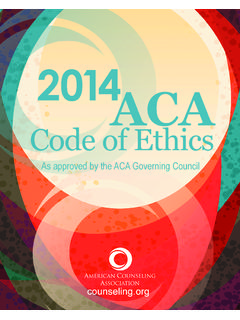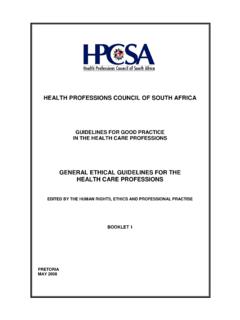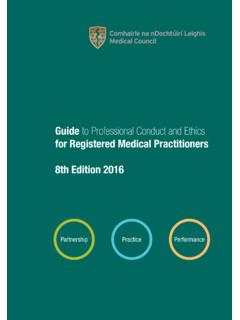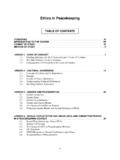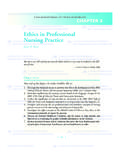Transcription of ABIH Code of Ethics
1 The Mark of professionalism American Board of Industrial Hygiene code of Ethics Introduction The American Board of Industrial Hygiene (ABIH) is a voluntary, non-profit, professional credentialing organization. ABIH certifies qualified industrial hygienists engaged in the practice of industrial hygiene, and who have met the professional knowledge standards established by the Board of Directors. Regardless of any other professional affiliation, the ABIH code of Ethics ( code ) applies to: each individual certified by the ABIH as a Certified Industrial Hygienist (CIH) or a Certified Associate Industrial Hygienist (CAIH) (certificants); and, each individual seeking ABIH certification (candidates). The code serves as the minimal ethical standards for the professional behavior of ABIH certificants and candidates.
2 The code is designed to provide both appropriate ethical practice guidelines and enforceable standards of conduct for all certificants and candidates. The code also serves as a professional resource for industrial hygienists, as well as for those served by ABIH certificants and candidates. Preamble/General Guidelines The ABIH is dedicated to the implementation of appropriate professional standards designed to serve the public, employees, employers, clients and the industrial hygiene profession. First and foremost, ABIH certificants and candidates give priority to health and safety interests related to the protection of people, and act in a manner that promotes integrity and reflects positively on the profession, consistent with accepted moral, ethical and legal standards.
3 As professionals in the field of industrial hygiene, ABIH certificants and candidates have the obligation to: maintain high standards of integrity and professional conduct; accept responsibility for their actions; continually seek to enhance their professional capabilities; practice with fairness and honesty; and, encourage others to act in a professional manner consistent with the certification standards and responsibilities set forth below. I. Responsibilities to ABIH, the profession and the public. A. Certificant and candidate compliance with all organizational rules, policies and legal requirements. 1. Comply with laws, regulations, policies and ethical standards governing professional practice of industrial hygiene and related activities.
4 2. Provide accurate and truthful representations concerning all certification and recertification information. 3. Maintain the security of ABIH examination information and materials, including the prevention of unauthorized disclosures of test information. 4. Cooperate with ABIH concerning Ethics matters and the collection of information related to an Ethics matter. 5. Report apparent violations of the Ethics code by certificants and candidates upon a reasonable and clear factual basis. 6. Refrain from public behavior that is clearly in violation of professional, ethical or legal standards. II. Responsibilities to clients, employers, employees and the public. A. Education, experience, competency and performance of professional services.
5 1. Deliver competent services with objective and independent professional judgment in decision-making. 2. Recognize the limitations of one s professional ability and provide services only when qualified. The certificant/candidate is responsible for determining the limits of his/her own professional abilities based on education, knowledge, skills, practice experience and other relevant considerations. 3. Make a reasonable effort to provide appropriate professional referrals when unable to provide competent professional assistance. 4. Maintain and respect the confidentiality of sensitive information obtained in the course of professional activities unless: the information is reasonably understood to pertain to unlawful activity; a court or governmental agency lawfully directs the release of the information; the client or the employer expressly authorizes the release of specific information; or, the failure to release such information would likely result in death or serious physical harm to employees and/or the public.
6 5. Properly use professional credentials, and provide truthful and accurate representations concerning education, experience, competency and the performance of services. 6. Provide truthful and accurate representations to the public in advertising, public statements or representations, and in the preparation of estimates concerning costs, services and expected results. 7. Recognize and respect the intellectual property rights of others and act in an accurate, truthful and complete manner, including activities related to professional work and research. 8. Affix or authorize the use of one s ABIH seal, stamp or signature only when the document is prepared by the certificant/candidate or someone under his/her direction and control.
7 B. Conflict of interest and appearance of impropriety. 1. Disclose to clients or employers significant circumstances that could be construed as a conflict of interest or an appearance of impropriety. 2. Avoid conduct that could cause a conflict of interest with a client, employer, employee or the public. 3. Assure that a conflict of interest does not compromise legitimate interests of a client, employer, employee or the public and does not influence or interfere with professional judgments. 4. Refrain from offering or accepting significant payments, gifts or other forms of compensation or benefits in order to secure work or that are intended to influence professional judgment. C. Public health and safety. 1.
8 Follow appropriate health and safety procedures, in the course of performing professional duties, to protect clients, employers, employees and the public from conditions where injury and damage are reasonably foreseeable. Effective Date: May 25, 2007



